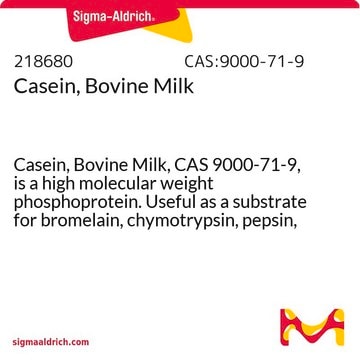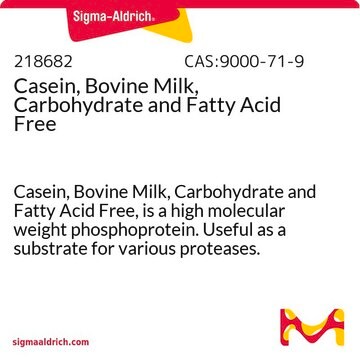Recommended Products
product name
Casein from bovine milk, technical grade
biological source
bovine milk
grade
technical grade
form
powder
technique(s)
activity assay: suitable
electrophoresis: suitable
immunocytochemistry: suitable
mp
280 °C (dec.) (lit.)
InChI
1S/C81H125N22O39P/c1-36(2)31-50(76(132)94-43(15-24-57(87)108)71(127)101-52(34-64(120)121)78(134)98-49(81(137)138)11-7-8-30-82)99-72(128)47(19-28-61(114)115)95-77(133)51(33-63(118)119)100-73(129)48(20-29-62(116)117)97-80(136)65(37(3)104)103-75(131)44(16-25-58(88)109)92-68(124)42(14-23-56(86)107)90-67(123)41(13-22-55(85)106)91-69(125)45(17-26-59(110)111)93-70(126)46(18-27-60(112)113)96-79(135)53(35-142-143(139,140)141)102-74(130)40(12-21-54(84)105)89-66(122)39(83)32-38-9-5-4-6-10-38/h4-6,9-10,36-37,39-53,65,104H,7-8,11-35,82-83H2,1-3H3,(H2,84,105)(H2,85,106)(H2,86,107)(H2,87,108)(H2,88,109)(H,89,122)(H,90,123)(H,91,125)(H,92,124)(H,93,126)(H,94,132)(H,95,133)(H,96,135)(H,97,136)(H,98,134)(H,99,128)(H,100,129)(H,101,127)(H,102,130)(H,103,131)(H,110,111)(H,112,113)(H,114,115)(H,116,117)(H,118,119)(H,120,121)(H,137,138)(H2,139,140,141)
InChI key
BECPQYXYKAMYBN-UHFFFAOYSA-N
Gene Information
bovine ... CSN1S1(282208) , CSN1S2(282209) , CSN2(281099)
Looking for similar products? Visit Product Comparison Guide
Related Categories
General description
Application
- a blocking agent in immunochemistry
- a substrate to determine the casinolytic activity in disintegrin and Cerastes cerastes venom
- as a fining agent to test its effect on white wine protein stabilization
Biochem/physiol Actions
Other Notes
Storage Class Code
11 - Combustible Solids
WGK
WGK 1
Personal Protective Equipment
Certificates of Analysis (COA)
Search for Certificates of Analysis (COA) by entering the products Lot/Batch Number. Lot and Batch Numbers can be found on a product’s label following the words ‘Lot’ or ‘Batch’.
Already Own This Product?
Find documentation for the products that you have recently purchased in the Document Library.
Customers Also Viewed
Our team of scientists has experience in all areas of research including Life Science, Material Science, Chemical Synthesis, Chromatography, Analytical and many others.
Contact Technical Service











